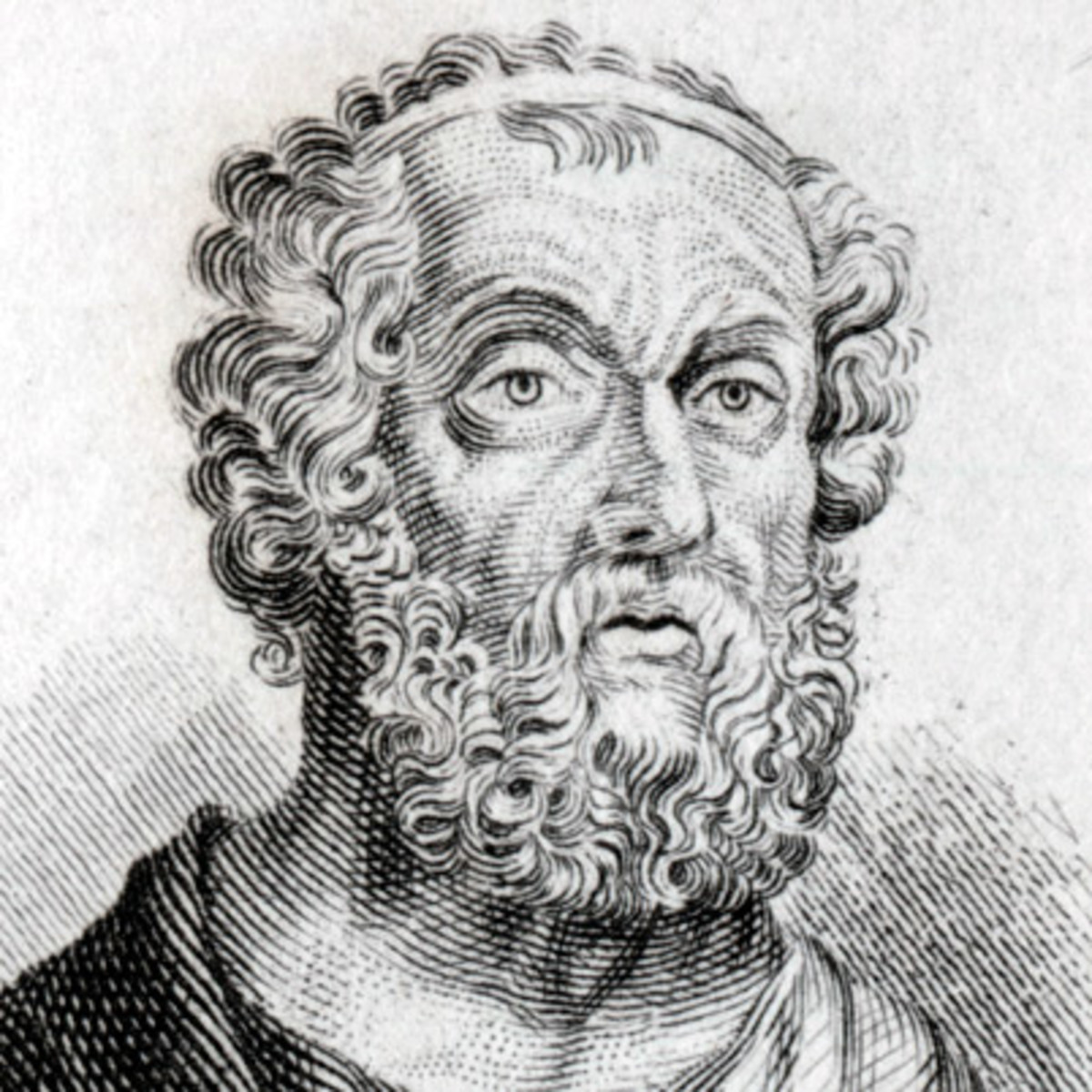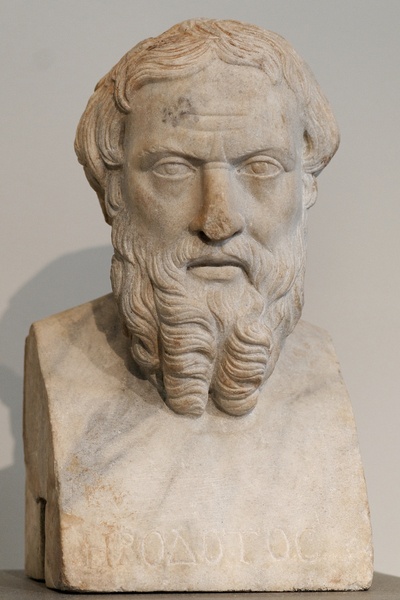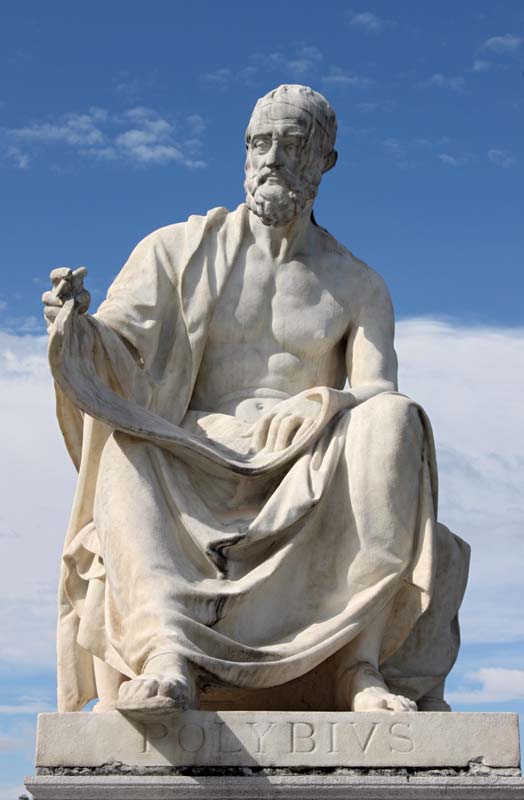Greek Historiography
The Foundation of Modern Historical Methodology
The interest in the study of history can be traced back to the Greeks as bards and poets traveled around the Mediterranean before knowledge was recorded. Historical tradition in the ancient Greek world consisted of firsthand accounts that were retold across generations. While these nomadic proto-historians were perhaps innumerable, very little of their product survives for obvious reasons, mainly because most people were illiterate. Since there is so little left, it is hard to determine how people thought about their history. To determine how the early Greeks through about history, us historians must look at their concepts of historiography, or the history of history. It was not until approximately the middle of the 5th century BCE that anyone began to record and codify their histories. Some of the earliest pre-Herodotean (commonly referred to as Greeks) recorded “history” assumes the form of what we call today “epic poetry.”
Homer, the First Greek Historian

Homer’s Illiad and Odyssey became the standard for recording events so they would not be forgotten. According to Dr. Andreas Karatsolis, Homer “may have been the only person who took these oral narratives and turned them into books.” Recording of a historically significant narrative took place later and broke away from the Homeric tradition of epic poetry but still retained the spiritual tone and content of Greek mythological tradition. It is due to this work of later writers that we get a glimpse into the thoughts of these early thinkers and how they thought about the past. The writings of Homer reflect other early thinkers on how history was focused on wars, battles and the reigns of leaders.
The Father of History: Finally, Someone Writes Some History NOT in Lyric Form!

Herodotus ( c. 484 – 425/413 BCE) is often referred to as “the father of history” but why? The modern word history itself is derived from the Greek word historie—meaning inquiry—which Herodotus used to describe his work. Though Herodotus breaks away from the earlier styles of oral history and poetry, he focuses on ethnographic and geographic inquiry, which he incorporated into his dramatic retelling of history. Herodotus retains elements of and acknowledgement of the social significance of Greek poetic tradition; that is…the prevailing Greek mythological traditions that significantly contributed to the cultural identity of the Greek world. That is not to say that Herodotus’ work speculated about the mythological realm but that it is sensitive to its cultural significance. For him, mythology and history were not mutually exclusive, the joined lessons of mythology and spirituality contribute heavily to the “larger overall historical trajectory.” (Kelley, 21) Herodotus practice of traveling throughout his world and conducting interviews and getting firsthand insight about events from various eyewitnesses contributes to the development of historical practice. All this while acknowledging the cultural significance of spiritual notions served to extend historical practice into the “mythical space.” (Kelley, 26) In The Histories , Herodotus claims that his purpose is an “effort to prevent the traces of human events from being erased by time, and to preserve the facts and importance of remarkable [human] achievements.” More importantly, this practice began to bridge the gap between later empirical/documentary history and earlier oral tradition while considering spiritual tradition.
Herodotus’ methodological contributions included several other fields of practice including geography, religious and cultural custom, and questions of national origin all woven into a foundation for social and cultural history. By developing and combining these disciplines, they would evolve over time into social and cultural history. In making recorded historical recollection an intimate narrative of human drama, Herodotus was able to give shape to the past through the eyes of individuals. In Herodotus’ imagination, the past should be retold through the lens of human emotion in order to capture the spirit of why it is important to record the past in the first place. Herodotus’ historical methodology has been detracted from and denounced throughout the centuries since the time of its creation, but he is still widely regarded as one of the earliest professional, methodologically consistent historians and has continued to be cited and further developed on for over two and a half thousand years, well into the modern era. Regardless of the perceived “truth” value of his content, Herodotus’ contributions to historiographical practice are undeniable.
Science, Politics, and Professionalism. Notions of Scientific History.

Not only did the notion of “professional” (I use this term loosely) history itself arise out of Greek tradition, so, too, did the modern notions of what we call “scientific history” and “political realism.” As a cultural and temporal contemporary of Herodotus, Thucydides (460-404 BCE) had a wildly different approach to the collection and recording of historical data. For Thucydides, history was a sort of fluid, constantly evolving “project of writing.” (Kelley, 29) Unlike Herodotus, Thucydides made no attempt to incorporate the spiritual/mythological traditions of his world into his compilation. If Herodotus is referred to as the “father of history,” Thucydides should be called the “father of scientific history.” His writings adhere to strict, self-imposed standards of evidence collection and analysis, source criticism, and examination of causal relationships; particularly regarding the causes of the events of the Peloponnesian Wars and their effects on the Mediterranean world. Thucydides examines his historical reality with a utilitarian approach based on empirical observations about human nature. He overtly avoids the existential realms of myth and antiquity and marginalizes the earlier classic works of “poetic history” like Homer and Hesiod. His concern is representing the events and processes that he is bearing witness to in real time and recording them as a narrative of nation-states rather than that of individuals.
Thucydides is referred to by Marieke Oldemeinen in The Political Realism of Thucydides and Thomas Hobbes as the founder of the school of thought called “political realism;” he suggested that “all life is political life and all history is political history,” in that all human behavior is analyzed in terms of people’s interaction with institutions. Late 19th/early 20th century classical historian Paul Shorey referred to Thucydides as a politically driven “cynic” (someone who believes people are motivated by self-interest) whose work was “devoid of moral sensibility”; but positivist thought exalted Thucydides as the canon of scientific objectivity and advanced evidence handling techniques. So much so that 18th century political philosopher David Hume said of him:
“The first page of Thucydides is, in my opinion, the commencement of real history. All preceding narrations are so intermixed with fable that philosophers ought to abandon them to the embellishments of poets and orators.”
The “Greatness of Rome:” Confessions of a Roman Fanboy

Both Herodotus and Thucydides made significant methodological and stylistic contributions to what would later evolve into the academic field of history. Many later historiographically significant publications adhere to one methodology or the other, some purposefully and some coincidentally. Polybius ( 203-122 BCE) shared some of the most significant thematic elements of both the work of Herodotus and Thucydides. The significance of both of those considerations lends credence to the importance of both Herodotus’ and Thucydides’ offerings to the field.
As the first millennium BCE ended, the Mediterranean world saw the rise of a new phenomenon, the Republic of Rome. Born to a politically prominent, wealthy, land-owning family in Megalopolis around 200 BCE, Polybius would chronicle and narrate the rise of the Roman Republic to prominence in the Mediterranean. His anthology, “The Histories” gives eyewitness testimony to events like the Roman sack of the North African trading capitol of Carthage. This event and other like them are woven into a panegyric narrative of what he calls “the inevitability of the greatness of Rome.” For example, he shared an interest with Herodotus in examining and explaining the emerging notion of “barbarism” (a term that holds unique significance in any discussion of Rome. Also note that this link leads to an interesting discussion of barbarians/barbarism in the Roman context but there exists a variety of schools of thought on the nature of the idea of barbarians/barbarism in the Roman imagination. I encourage you to explore further.) and the threat it represented to both individuals but more broadly individuals as the members of civilizations. Barbarism in the Roman context, can be loosely thought of as anyone who was not “Roman.” Like Thucydides, Polybius concerned himself with the discussion of politics and the affairs of interstate relationships and how they shaped the geopolitical landscape. Polybius himself was heavily involved in Roman politics and diplomacy, and he listed heavily towards the objective politicization of history conceived by Thucydides. Polybius discussion of these themes; however, is couched in terms of how they compare and relate to his ideas about Roman nationalism.
Polybius must have seen the writing on the wall in his practice of using archaeology to explain what he seemed to think was predetermined, that is the rise of Rome. That is, he used analysis of the events of the Greek Mediterranean narrative to make projections that explained how Rome came to dominate that world. He asserts that Rome was born out of greatness and was the very origin of earthly civilized society. Though, in contrast to his discussion of the alleged inevitability of Roman greatness he attributes the rise and fall of civilizations ultimately to human error. Polybius’ writings on republican political practice and constitutional theory were so prolific that they were espoused by American founding father John Adams and French Political theorist Charles de Montesquieu. Montesquieu’s treatise The Spirit of the Laws drew heavily on Polybian notions of civic republicanism.
Moving Forward while Looking Back: Do Not Try This While Driving!
Although Herodotus and Thucydides contributed significantly to historiographical practice in general, they did very little to develop the practice in theoretical terms. Their methodologies are based on the ideas of history over space and time rather than an overt desire to create paradigms about how to practice historiography, though their ideas and practices themselves would hold significant value in the later development of historiography as a scientific discipline of its own. Their ideas concluded, in part, that history is ultimately inclusive of a host of other human-centric sciences like political philosophy, geography, theology, etc. As historiography and historical inquiry continued to develop as a historical discipline with its own intrinsic value, historians like Polybius and others that later ‘practiced’ in his method began to lend the makings of theoretical and scientific validity to history and historiography as academic disciplines. All the while within the practice of history itself, literary style, political influence and analysis, and religious and moral inclinations and implications developed as concerns with in the methodology of historical inquiry. These narratives all seemed to lay a foundation on which later Roman historians would build a nationalist vision of history that incorporated the practices of the Greek world and set Rome apart as a “city on a hill.”
Conciser This
- What information can be lost from switching from Oral traditions to writing?
- Can mythology and history work side by side and still be accurate? Explain.
- What do historians loose when we choose to just write the facts?
Further Reading
- Victor Castellani “Beginnings of Ancient Greek History and Historiography”
- Thomas F. Scanlon “Greek Historiography”